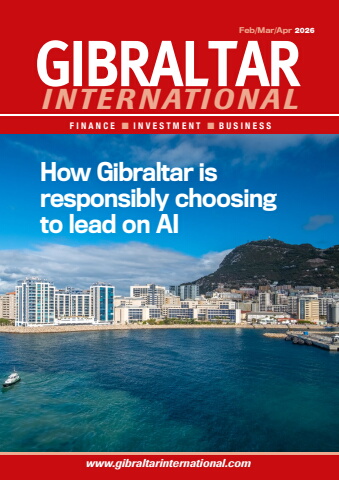Surprise insurance sector growth extends appeal
Two life insurance companies, including a large international entity, are planning to begin operations in Gibraltar, projecting this aspect of the insurance business within the jurisdiction from “tiny” to “significant”, it can be revealed
They are the latest in a growing line of insurance firms showing interest in establishing businesses, which Mike Ashton, the specialist insurance business senior finance executive at Gibraltar Finance, describes as “a level of activity greater than at any time in the last 18 months”.
He said: “Since mid-August there has been an unexpected increase in the number of people contacting me and expressing an interest in Gibraltar in respect of insurance structures – potential applicants looking to set up a company or MGAs (managing general agents).
[MGAs are specialised type of insurance agent/brokers that, unlike traditional agents/brokers, have underwriting authority from an insurer and are responsible for some functions ordinarily handled by insurers including settling claims.]
“I think previously there was a reticence to do anything, people held back – a wait and see attitude – but once the UK’s referendum on the EU was announced last year, it crystalised their thinking about making their business plans, particularly when they either are predominantly or completely UK-focused”, Ashton explained.
UK links appealing
“It’s become quite appealing to people looking at Gibraltar that we have these bi-lateral trading relations for insurance with the UK – the Gibraltar Order, referring to EU legislation and Directives – but it’s now apparent that those relationships will continue after any divorce, whether it’s a hard or soft Brexit.” It’s expected that the Gibraltar Order will be slightly amended to refer back to the UK legislation, and that this will be done swiftly to enable insurers to continue to write business into the UK.
In the year to April, the Financial Services Commission (FSC) licensed ten insurance entities, and in the six months to end-September a further eight license applications have been approved. There has been no new insurance company license granted this year so far, compared with two – AA and Watford – in the year to April. However there have been a number of extensions to existing licenses granted to the 51 active insurance companies, reflecting existing insurers going into new areas or types of business.
In both periods there have been two new general insurance intermediaries, and in the six months to end-September, one new life intermediary bringing the total to four.
Life interest
There is also serious interest from two insurance entities in extending the jurisdiction’s life insurance sector, which at present is restricted to just four firms, representing only a very small part of Gibraltar’s insurance business – life-insurance gross premium income was just under £100m in 2014 (the latest figures available), compared to £3.6bn for non-life business, including captives. One of the new life insurance businesses is “at a very early stage in its license application” with the intention of getting an application submitted before the end of the year, but the other has an application that is close to being granted, Ashton confirmed.
“It is an area that has lots of potential to make a very significant impact [on the territory’s insurance sector] and this would help diversify our insurance potentially the market that is dominated by motor insurance.”
A Deloitte (Gibraltar) motor insurance seminar in early October disclosed that the territory’s motor insurers account for 21% of the UK market, up slightly from last year’s 20% figure. Some 92% of those companies’ premiums in the period 2010-14 were generated in the UK, and these account for the bulk of Gibraltar’s insurance market at present.
Strong links impress
Despite Brexit-prompted uncertainty in some areas, realization of Gibraltar’s strong UK links has helped crystalise the thinking of insurers that are either predominantly or completely UK-focused. “They think ‘why should we wait; let’s get on with it now’. There’s sufficient certainty about the future for us to get on and get these structures set up, so they are working on applications”, Ashton insists.
He sees it as “a great opportunity for MGA’s” – Insure The Box, a specialist car insurance large MGA that targets new drivers with use of telematics, opened in Gibraltar in 2010. Another similar enterprise, Smart Driver Insurance, gained its Gibraltar operating license in the last six months.
Admiral Insurance is understood to be the largest motor underwriter in Gibraltar, accounting for more than £932m in total gross written premiums last year.
Gibraltar is home to almost half of the foreign insurers that operate in the Irish market, but the largest, Zenith Insurance, has decided to end writing motor business there from February 2017 with “high claims” said to be amongst the principle reasons, as well as an increasing regulatory burden and an uncertain legislative climate.
Another MGA licence application is understood to be in progress with the applicant aiming to be in business by the year-end. It reportedly will start with a core team, which is expected to grow significantly as, even though an MGA, it will have wide authority in respect of underwriting and claims handling making it as near to being an insurance company without actually becoming one with the liabilities on its books.
There are two key attractions of Gibraltar for insurers. “The relationship with the regulator and the speed to license are critical”, Ashton said, “because in a small jurisdiction unless you can offer that differentiation, businesses will stay within a larger domicile.”
He stated an ability to easily access the Regulator, raise questions and meet the licensing team could normally be achieved in a matter of days, “rather than have to wait weeks or even months in other jurisdictions before you can get to see the regulator; this is a big plus.”
The government is seeking to ensure “a business-friendly environment” and application timescales can be kept low “provided we receive the highest quality in applications – ones that are completed fully and do not leave open questions about the business approach, or how it will be run.” Ashton maintained: “In the past this has not always been the case. We are saying to insurance managers that when working with these potential new clients, it will delay things if the FSC thinks that people are not paying attention to the detail; it may raise questions about how they run their businesses.”
It usually takes six months from beginning to end to process an insurance company application, but the FSC service level standard is to provide an in principle decision within 18 weeks, assuming all required information has been supplied.
Gibraltar forgotten
In response to sector demands for greater application ‘firepower’, Kristian Menez, a Partner at accountants, PwC (Gibraltar) specialising in financial services regulatory requirements, has been seconded to work two days a week with the FSC for six months.
The FSC, in a statement, said that Menez “possesses sound knowledge of the local insurance market and is able to process insurance applications with limited assistance and also provide key input into the current authorisations process”, and added: “This will, of course, be beneficial with regards to time pressure; however it is his insurance expertise which is of most value for us at this time”.
There will be no dilution of regulatory standards, however, Ashton emphasised!
After years of lobbying, Gibraltar hopes soon to accept Part VII transfers that in particular would facilitate run-off or legacy business, from UK insurers’ portfolios under the Financial Services & Markets Act 2000.
“When large insurers begin to look at their discounted liabilities – books of discontinued business for which they are still accountable – on which they may no longer be making money, or have only marginal profitability – it is possible they will decide to sell to a specialist run-off business at a discounted rate and produce capital,” explained Steve Quinn, chief executive of Gibraltar insurance manager, Quest.
Test case progresses
An insurer can with regulatory approval, make an application to the UK Court for transfer of an insurance portfolio to another insurance company. Quinn reckoned: “There is a thriving run-off market in the UK worth billions of pounds in liabilities that could be accessible to us. Most of the large firms [insurers] have big chunks of business in dormant portfolios, for example.”
But Gibraltar was ‘forgotten’ when the UK drew up its Part 7 agreement, but every other EU and EEA territory can take on that work. In mid-2014 the Gibraltar Government confirmed that it had received written confirmation from the UK Treasury, that Part VII transfers can take place between UK and Gibraltar insurers without a change of law, subject to Court and regulatory approval.
That remains the Treasury position today, but uncertainty revolves around the different constitutional status of Gibraltar as an associate member within the EEA. UK lawyers have pointed out there was no certainty that insurers disposing of their run-off business to a Gibraltar company would not still be held liable within the UK if something went wrong – and importantly, that the full liability of that insurance business under Solvency II would still be counted against the original insurer and add to that company’s retained capital requirement.
Test case attraction
Now a large UK insurer proposes to transfer a small part of its business to a Gibraltar entity and it is with UK regulators for approval prior to a High Court test case. However, Ashton believes that in a Brexit situation, Part VII transfers could proceed, because there would be no need to refer back to Gibraltar not being an EEA state in its own right. “I think it could become very attractive in terms of the assets and liabilities involved”, he concluded.
No Gibraltar firms have revealed plans to quit the jurisdiction, because Brexit might mean an end to passporting of services between Gibraltar and EU countries. Elite Insurance, which specialises in legal expenses, professional indemnity and general insurance, located in 2011 its business to Gibraltar from the UK where it retains an office. Revealing in September that it had decided to set up a subsidiary in Luxembourg, Elite’s chief executive Jason Smart, explained: “The issue for us is that we cannot afford to let our customers just wait and see what happens between the British government and the rest of Europe, we do not feel that is fair.” However, Elite already has offices in Spain, Italy and France.
Red Sands, the territory’s broad-based insurance company since 2004 with £103m written premiums in 2015 from pet, ancillary motor products and insurance backed guarantee markets, is possibly the largest with overseas interests. It declared shareholder dividends of £15m, five times greater than a year earlier and is expanding its European business beyond the 15 EU countries, including the UK, that it operates in. The Red Sands website claims it is “the fastest growing whole-life insurers in eastern Europe”.
Insurance-linked securities (ILS), essentially financial instruments sold to investors whose value is affected by an insured loss event (frequently described as catastrophe bonds), and other forms of risk-linked securitisation, is a market Ashton still sees as offering potential, although only two deals have been completed so far.
Gibraltar’s fast-growing Lottoland business, renewed its €100m ILS two-year funding after two large pay outs this year totaling €36m failed to fase investors renewing their support with a fresh ILS deal to protect the firm from both large jackpots and any accumulation of small wins over multiple lotteries.
“We are still looking to promote ILS business, but it takes time partly because most of these transactions relate to north America and it is why Bermuda has been most successful,” Ashton reported.





